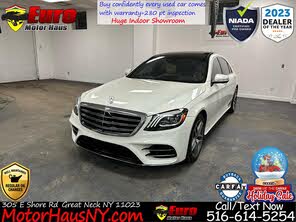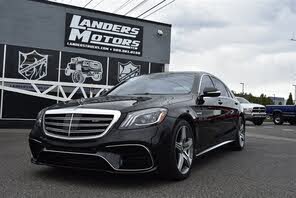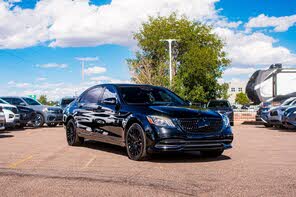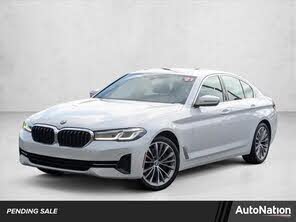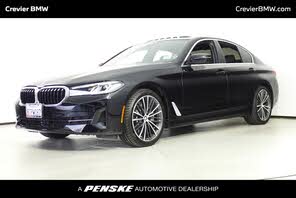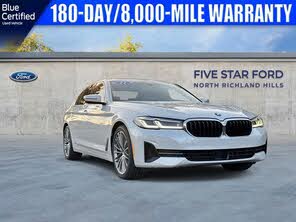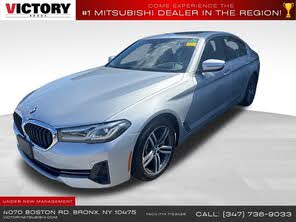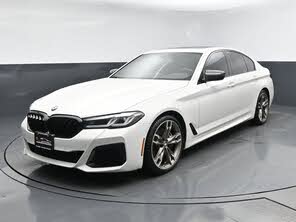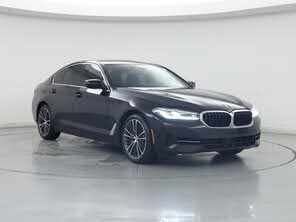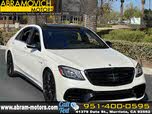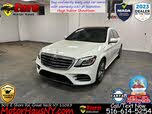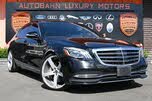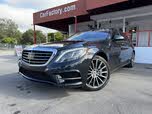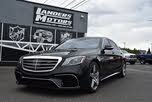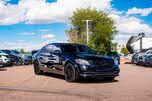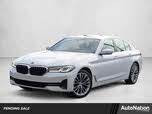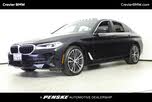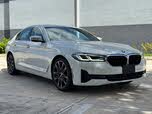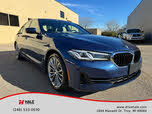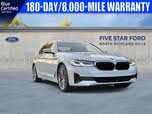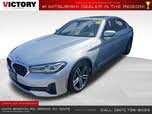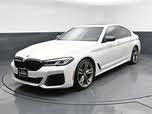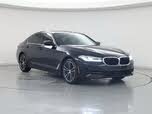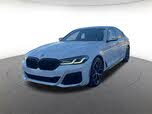2020 Mercedes-Benz S-Class vs 2021 BMW 5 Series
Overview | |
MSRP$94,250 | MSRP$54,200 |
Listings153 | Listings295 |
Ratings & Reviews | |
User Reviews | User Reviews |
Expert reviews | Expert reviews8.0 out of 10 |
Pros
Cons
| |
2020 Mercedes-Benz S-Class Reviews Summary | |
2021 BMW 5 Series Reviews SummaryBMW was once known for sports sedans, and the 5 Series was one of the most prolific of those sedans. Sitting between the 3 Series and 7 Series in size and price, previous generations of 5 Series were known for a balance of performance and luxury, with impeccable engineering throughout. Today, the BMW 5 Series is largely irrelevant. The 3 Series is now so big that there is less reason to upgrade, and most buyers are more interested in SUVs anyway. The competition—including the Audi A6, Jaguar XF, Mercedes-Benz E-Class, and Volvo S90—has also gotten better. That doesn’t mean BMW has given up on the 5 Series. The current generation (codename G30) arrived for the 2017 model year, but it gets a midcycle refresh (or LCI, short for “Life Cycle Impulse,” in BMW speak) for 2021. Major updates include a 48-volt mild-hybrid system, a bigger infotainment touchscreen, and subtle styling changes. The 2021 BMW 5 Series is not like the 5 Series models of old. That may drive away hardcore car fans, but the 2021 model makes a strong case to new-car buyers, maintaining sportier-than-average driving dynamics, along with the tech and luxury features expected of a car in this segment. | |
No video found | No video found |
Popular Features & Specs | |
Engine3.0L 362 hp V6 | Engine2.0L 248 hp I4 |
Drive TrainRWD | Drive TrainRWD |
Seating Capacity5 | Seating Capacity5 |
Horsepower | Horsepower248 hp @ 5200 rpm |
MPG City19 | MPG City25 |
MPG Highway28 | MPG Highway33 |
Engine | |
Engine Name3.0L 362 hp V6 | Engine Name2.0L 248 hp I4 |
Torque | Torque257 lb-ft @ 1500 rpm |
Horsepower | Horsepower248 hp @ 5200 rpm |
DrivetrainRWD | DrivetrainRWD |
Fuel Economy | |
MPG City19 | MPG City25 |
MPG Highway28 | MPG Highway33 |
Interior | |
Leather SeatsStandard | Leather Seats |
Seating Capacity5 | Seating Capacity5 |
Key Features | |
Navigation SystemStandard | Navigation SystemStandard |
Sunroof/MoonroofStandard | Sunroof/MoonroofStandard |
Dimensions & Capacity | |
Cargo Space16.3 cu ft | Cargo Space14.0 cu ft |
Curb Weight4553 lbs | Curb Weight3765 lbs |
Height58.8 in | Height58.2 in |
Length206.9 in | Length195.8 in |
Width83.9 in | Width83.7 in |
Wheelbase124.6 in | Wheelbase117.1 in |
Maximum Payload | Maximum Payload800 lbs |
Number of doors4 | Number of doors4 |
Overview | ||
MSRP | $94,250 | $54,200 |
Listings | ||
Ratings & Reviews | ||
User reviews | ||
Expert reviews | 8.0 out of 10Read full review | |
Pros & cons | Pros
Cons
| |
Summary | BMW was once known for sports sedans, and the 5 Series was one of the most prolific of those sedans. Sitting between the 3 Series and 7 Series in size and price, previous generations of 5 Series were known for a balance of performance and luxury, with impeccable engineering throughout. Today, the BMW 5 Series is largely irrelevant. The 3 Series is now so big that there is less reason to upgrade, and most buyers are more interested in SUVs anyway. The competition—including the Audi A6, Jaguar XF, Mercedes-Benz E-Class, and Volvo S90—has also gotten better. That doesn’t mean BMW has given up on the 5 Series. The current generation (codename G30) arrived for the 2017 model year, but it gets a midcycle refresh (or LCI, short for “Life Cycle Impulse,” in BMW speak) for 2021. Major updates include a 48-volt mild-hybrid system, a bigger infotainment touchscreen, and subtle styling changes. The 2021 BMW 5 Series is not like the 5 Series models of old. That may drive away hardcore car fans, but the 2021 model makes a strong case to new-car buyers, maintaining sportier-than-average driving dynamics, along with the tech and luxury features expected of a car in this segment. | |
Video | No video found | No video found |
Popular Features & Specs | ||
Engine | 3.0L 362 hp V6 | 2.0L 248 hp I4 |
Drive Train | RWD | RWD |
Seating Capacity | 5 | 5 |
Horsepower | 248 hp @ 5200 rpm | |
MPG City | 19 | 25 |
MPG Highway | 28 | 33 |
Engine | ||
Engine Name | 3.0L 362 hp V6 | 2.0L 248 hp I4 |
Torque | 257 lb-ft @ 1500 rpm | |
Horsepower | 248 hp @ 5200 rpm | |
Drivetrain | RWD | RWD |
Fuel Economy | ||
MPG City | 19 | 25 |
MPG Highway | 28 | 33 |
Interior | ||
Leather Seats | Standard | |
Seating Capacity | 5 | 5 |
Key Features | ||
Navigation System | Standard | Standard |
Sunroof/Moonroof | Standard | Standard |
Dimensions & Capacity | ||
Cargo Space | 16.3 cu ft | 14.0 cu ft |
Curb Weight | 4553 lbs | 3765 lbs |
Height | 58.8 in | 58.2 in |
Length | 206.9 in | 195.8 in |
Width | 83.9 in | 83.7 in |
Wheelbase | 124.6 in | 117.1 in |
Maximum Payload | 800 lbs | |
Number of doors | 4 | 4 |

By: CarGurus + AI
At CarGurus, our team of experienced automotive writers remain at the heart of our content operation, conducting hands-on car tests and writing insightful guides that are backed by years of industry experience. To complement this, we are harnessing AI to make our content offering more diverse and more helpful to shoppers than ever. To achieve this, our AI systems are based exclusively on CarGurus content, ratings and data, so that what we produce is both unique to CarGurus, and uniquely helpful to car shoppers.





